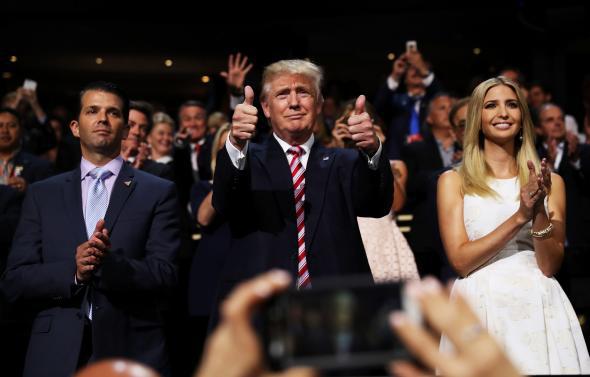If elected president, Donald Trump’s global business empire would represent one sprawling mess of conflicts of interest and ethical morasses for himself and, by extension, the United States. That’s the big takeaway from a lengthy investigation by Newsweek’s Kurt Eichenwald published Wednesday. Eichenwald documents what he describes as a “web of contractual entanglements” between the Trump Organization and foreign corporations with close ties to their own respective governments. The ensuing conflicts would be impossible to avoid unless Trump and every member of his family cut financial ties with their business for good. The Republican nominee, however, has made it abundantly clear that he has no such plans to do that if he wins this November, even as he and his campaign continue to call for the Clinton Foundation to be shut down.
The Newsweek piece doesn’t find any evidence of wrongdoing by the Trump organization in the present tense. Instead it offers individual snapshots of several of Trump’s existing global business interests that would quickly become intertwined with, and in some ways indistinguishable from, U.S. foreign policy if Trump were in the Oval Office. While no single deal stands out as damning, taken together—and combined with what we already know about Trump’s business relationships—they illustrate the troubling overlap that would exist between the Trump Organization and a Trump administration if Trump doesn’t sufficiently separate himself from his business.
There’s the South Korean engineering and construction company that Trump is allied with, which would stand to benefit greatly if a President Trump followed through with his suggestion that the U.S. government should push South Korea and other Asian countries to acquire nuclear weapons to aid in their defense against North Korea. There’s the Trump Organization’s planned expansion in India, where government officials could feel pressure from, or be enticed by, a Trump White House to dismiss an ongoing investigation into one of Trump’s business partners to clear the way for such developments. And there’s also Trump’s recently strained business relationships in Turkey and the United Arab Emirates, key Muslim allies in the United States’ fight against ISIS and countries where Trump’s financial interests would run counter to U.S. foreign ones.
Newsweek’s list goes on: Trump has potentially problematic business dealings in Russia, Ukraine, and Azerbaijan (all of which are detailed in the magazine) as well as China, Brazil, Bulgaria, Argentina, Canada, France, and Germany.
Team Trump’s response on Wednesday was much as it has been throughout the campaign: a shrug followed by misdirection. Speaking on ABC’s Good Morning America, Trump’s daughter Ivanka, who is an executive in her father’s company, said that she and her adult siblings would simply take over the business and everything would be fine. “My father already said he would put it into a blind trust and it would be run by us,” she said. “So he’s been very articulate on that fact and outspoken.”
But there’s one massive problem with that statement: While it’s true that Donald Trump has said that his kids would take over the company, such a proposal is by definition not a blind trust. In an actual blind trust, an independent trustee—that is, not someone’s own children—takes over a public official’s portfolio, thereby allowing the official to operate without knowledge of where or how his money is invested in order to avoid it influencing his decisions. (There’s no federal law requiring presidents to create a blind trust, though most have in modern times. One notable exception: President Obama, whose assets are mostly in your more run-of-the-mill index funds and Treasury notes, which he discloses publicly.)
Even if Trump did end up setting up an actual blind trust, with an actually independent trustee, Trump would still likely be aware of many of the Trump Organization’s business dealings, given that it makes money by having companies pay for the rights to use the Trump name on buildings and products. As long as Trump’s personal brand remains front and center in his business, a blind trust would effectively be impossible. That’s a problem without an easy solution, but that’s no excuse for Trump’s refusal to concede the problem exists.
Trump nearly admitted the blind trust would be anything but blind earlier this year. “Run the company, kids. Have a good time,” he said during a GOP primary debate back in January when pressed by moderators. “I would put it in a blind trust. Well, I don’t know if it’s a blind trust if Ivanka, Don and Eric run it. But—is that a blind trust? I don’t know.” Nine months later, either he still doesn’t know, or he just doesn’t care.
